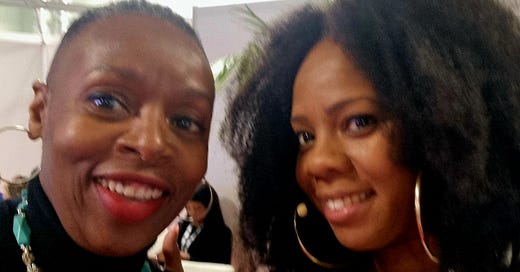Black Authors, white publishers
I'm really looking forward to attending the Black British Book Fair in Manchester on Saturday (29th March). This year is particularly special for me because, courtesy of the BBBF, I received a complimentary ticket to the London Book Fair. Along with Frankfurt it's one of the two biggest world book fairs. It was a fascinating, if tiring day, but it was great to have a guided tour of the Fair with founder Selina Brown and the rest of the BBBF team and a Round Table discussion with other writers in the Author’s Lounge which was sponsored by the BBBF, (before then, apparently, there was nowhere for authors to sit and network.) For an organisation that held its first event in 2021 it has come on in leaps and bounds. It very much gives the lie to the assumption that Black people don't read.
The issue is that an overwhelmingly white, (female and middle class) industry doesn't know how to reach us. Post George Floyd there was a flurry of book deals done with Black authors but what's clear five years on is that many of these books were not marketed well (or in some cases barely at all).
I spoke to one author who struggled to get her publishing company to even return emails and phone calls, even when a major festival was trying to get her to attend. (The festival wouldn't confirm her slot until they had made contact with her (big five) publisher, but calls went unanswered.)
I listen to lots of writeterly podcasts and one in particular - The Publishing Rodeo really stood out. The guest did a deep dive into publishing sales and found that the main factor which correlated with the success of a book was the amount spent by the publisher on marketing. Lots of good books died a death, and lots of mediocre books did surprisingly well. No marketing budget, no success.
If a publisher spends precious little on marketing a book (possibly because they only signed the author as tick-box exercise), and the book does not do well, this is used as evidence of the lack of a market and future potential Black authors suffer.
Selina's interview in today's Guardian, highlights the fact that post-Floyd the number of books being published by black authors had actually declined. This is depressing but not inevitable. The rush to remove any hint of DEI from the websites of big companies in the wake of Donald Trump's election in the US certainly suggests that many companies were only paying lip service to it in the first place.
As a Black author whose debut is out this year I'm worried. However I know that I'm (relatively) lucky. My publishers CassavaRepublic are a Black owned company and my novel The Mercy Step, is their ‘Lead title’ for the year - which means it gets a (relatively) healthy marketing budget. One result of the marCassavsketing spend is that they hired a top Book PR company who did the legwork to bring it to the attention of The Observer who selected me as I've of their best debut novelists of 2025 - the only black woman in the list.
Black authored books can sell but it requires imagination and creativity on the part of publishers. Now is the time to double down, not the time to shut up shop.



